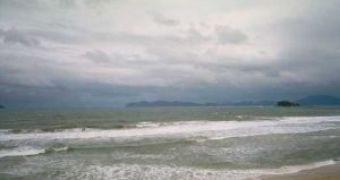Everyone who has walked on the sea shore knows that the sea has that specific smell, which some find it fishy, tangy, more or less stinky while for others it can be the delightful odor of the past holidays.
Researchers have been puzzled where this smell comes from, till recently a team discovered its provenience in a gas produced by some ocean-dwelling bacteria.
The same gas seems to be important in cloud formation over the ocean and helps some marine animals find food.
It was long known that sea bacteria produced a gas called dimethyl sulfide (DMS), in places where dead plankton and seaweed were decomposed.
This gas gives sea water the stinky smell, being a sulfur compound like hydrogen sulfide that gives the smell of the rotten eggs.
While "it was known that quite a lot of bacteria could [produce DMS], no one had thought to ask how," said Andrew Johnston of the University of East Anglia.
The research team took sampled mud from the salt marshes along Britain's shore and isolated a new strain of bacteria.
The researchers compared its genome to other known bacterial genomes and this way, they identified the gene behind the conversion of dimethylsulfoniopropionate (DMSP), a plant's decay products, into DMS.
The team expected to find just one enzyme breaking down the DMSP into DMS, but the process revealed to be more complicated as the DMSP molecule is much tougher to break down than thought.
The bacteria do not produce the enzymes until decaying plankton is nearby.
But when there is a massive plankton death caused by various factors, the bacteria hurry up to benefit of the feast. "The bacteria will only switch on the genes to break down DMSP if the DMSP is around," Johnston said.
The team also transferred the gene for breaking down DMSP to bacteria that lacked it, like E. coli, and the engineered bacteria were able to produce DMS.
"This mechanism is neither the only way, nor the primary way, that bacteria break down the estimated 1 billion tons of DMSP in the ocean, but it is important nonetheless as DMS releases over the open ocean influences cloud formation, which can influence Earth's climate." said Johnston.
Some seabirds use DMS to find food, like albatrosses, petrels, shearwaters and prions.
Once, the team opened a bottle filled with the DMS-producing bacteria, only to be bombarded by hungry seabirds.

 14 DAY TRIAL //
14 DAY TRIAL //